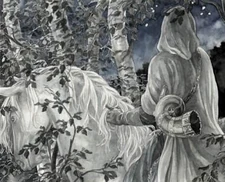Oromë (Quenya: [ˈorome] "Horn-blower"), also known as Aldaron (Quenya: "Lord of Forests"), Araw (Sindarin), and Arômêz, was an Ainu, one of the Aratar and the Vala responsible for the hunt. He was the brother of Nessa and husband of Vána.[2]
Biography

During the Years of the Trees, after most of the Valar had withdrawn completely from Middle-earth and hidden themselves in Aman, Oromë still hunted in the forests of Middle-earth on occasion. Thus, it was he who discovered the Elves when they first awoke at Cuiviénen and named them the Eldar. [3] Thereafter, he remained close in friendship with them.
A powerful huntsman, he was active in the struggles against Morgoth. He had a great horn called the Valaróma and a great steed named Nahar.[2] Huan, a Hound from Valinor, once belonged to him but was later given to Celegorm, a son of Fëanor.[4]
In legend, Oromë is said to have first created the Rainbow or "Bridge of Heaven" using golden threads of Vána's hair, during the Hiding of Valinor.[5]
Character
Oromë is described as a mighty lord and a great huntsman, as he would often train his folk and beasts in pursuit of evil creatures. He loved the lands of Middle-earth and was initially unwilling to leave it. He contrasts with the Vala Tulkas in demeanor; whereas Tulkas laughs in sports, Oromë is said to be dreadful in anger.[2]
Maiar of Oromë
In other versions
In earlier versions of the legendarium Aulë and Yavanna were the parents of Oromë and Nessa. Furthermore, Oromë and his wife Vána were once envisioned to have had a daughter named Nielíqui.[6]
Etymology

Oromë means "Horn-blowing" or "Sound of horns",[7] deriving from the Valarin name Arômêz.[8]
Araw is the Sindarin translation of Oromë.[8] The Sindar additionally referred to him as Tauron, which means "Lord of the Forests" and "The Forester."[7] It is possible that the name comes from Sindarin taur ("forest") or Quenya taure ("great wood").[9]
Other names
In the Old English translation of tales by Eriol, Oromë is called Wadfrea ("The Huntinglord"), Huntena frea ("Lord of Hunters"), and Wealdafrea ("Lord of Forests").[10] Among the Rohirrim and other Northmen, he was also sometimes called Béma (Old English, originally Béaming; translating Tauron "forest-lord").[11]
Translations
| Foreign Language | Translated name |
| Amharic | ዖሮሜ |
| Arabic | أوروم |
| Armenian | Օրոմը |
| Belarusian Cyrillic | Оромё |
| Bengali | ওরমে |
| Bulgarian Cyrillic | Ороме |
| Burmese | ဪရောမေ ? |
| Cambodian | ោរោមេ ? |
| Chinese (Hong Kong) | 歐羅米 |
| Georgian | ორომე |
| Greek | Όρομε |
| Gujarati | ઑરોમે |
| Hebrew | אורומה |
| Hindi | ॐरोमे |
| Japanese | オロメ |
| Kannada | ಒರೊಮೆ |
| Kazakh | Ороме (Cyrillic) Оромё (Latin) |
| Korean | 오로메 |
| Kyrgyz Cyrillic | Оромэ |
| Macedonian Cyrillic | Ороме |
| Marathi | ओरोमे |
| Mongolian Cyrillic | Оромё |
| Nepalese | ॐरोमे |
| Persian | اورومه |
| Punjabi | ਓਰੋਮੇ |
| Russian | Оромэ |
| Sanskrit | ॐरोमे |
| Serbian (Cyrillic) Orome (Latin) | Ороме |
| Sinhalese | ඕරොමෙ |
| Tajik Cyrillic | Ороме |
| Tamil | ஓரொமெ |
| Telugu | ఓరొమె |
| Thai | โอโรเม |
| Ukrainian Cyrillic | Ороме |
| Urdu | ورومے |
| Uzbek | Ороме (Cyrillic) Orome (Latin) |
| Yiddish | אָראָמע |
| Ainur of Arda | |
|---|---|
| Valar | |
| Kings | Manwë (Súlimo) • Ulmo (Ulubôz) • Aulë (Návatar) • Oromë (Aldaron) • Námo (Mandos) • Irmo (Lórien) • Tulkas (Astaldo) |
| Queens | Varda (Elentári) • Yavanna (Kementári) • Nienna • Estë • Vairë • Vána • Nessa |
| Enemies | Melkor (Morgoth) |
| Maiar | |
| Valinor | Eönwë • Ilmarë • Ossë • Uinen • Salmar • Melian • Arien • Tilion • Curumo (Saruman) • Olórin (Gandalf) • Aiwendil (Radagast) • Alatar (Morinehtar) • Pallando (Rómestámo) |
| Enemies | Curumo (Saruman) • Durin's Bane • Gothmog • Mairon (Sauron) |
| Enemies (possible Ainur) |
Ungoliant • Shelob |
References
- ↑ The Silmarillion, Quenta Silmarillion, Chapter I: "Of the Beginning of Days"
- ↑ 2.0 2.1 2.2 The Silmarillion, Valaquenta, "Of the Valar"
- ↑ The Silmarillion, Quenta Silmarillion, Chapter III: "Of the Coming of the Elves and the Captivity of Melkor"
- ↑ The Silmarillion, Quenta Silmarillion, Chapter XIX: "Of Beren and Lúthien"
- ↑ The History of Middle-earth, Vol. I: The Book of Lost Tales Part One, chapter IX: "The Hiding of Valinor"
- ↑ The History of Middle-earth, Vol. I: The Book of Lost Tales Part One, chapter III: "The Coming of the Valar and the Building of Valinor", Notes and Commentary
- ↑ 7.0 7.1 The Silmarillion, Index of Names
- ↑ 8.0 8.1 The History of Middle-earth, Vol. XI: The War of the Jewels, Part Four: Quendi and Eldar, Appendix D: Kwen, Quenya, and the Elvish (especially Ñoldorin) words for 'Language
- ↑ The History of Middle-earth, Vol. V: The Lost Road and Other Writings, Part Three: "The Etymologies"
- ↑ The History of Middle-earth, Vol. IV: The Shaping of Middle-earth: The Quenta, The Ambarkanta, and The Annals, III: "The Quenta", Appendix 1: Translation of Quenta Noldorinwa into Old English
- ↑ Encyclopedia of Arda
